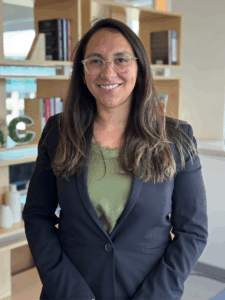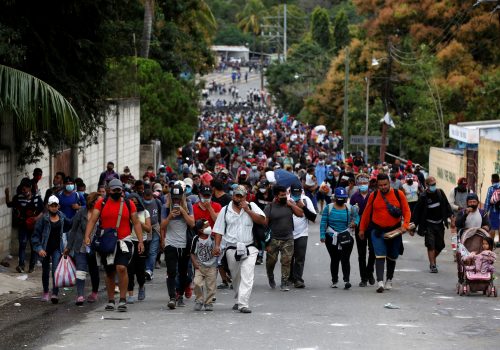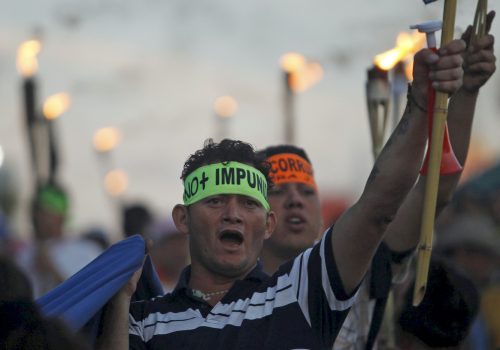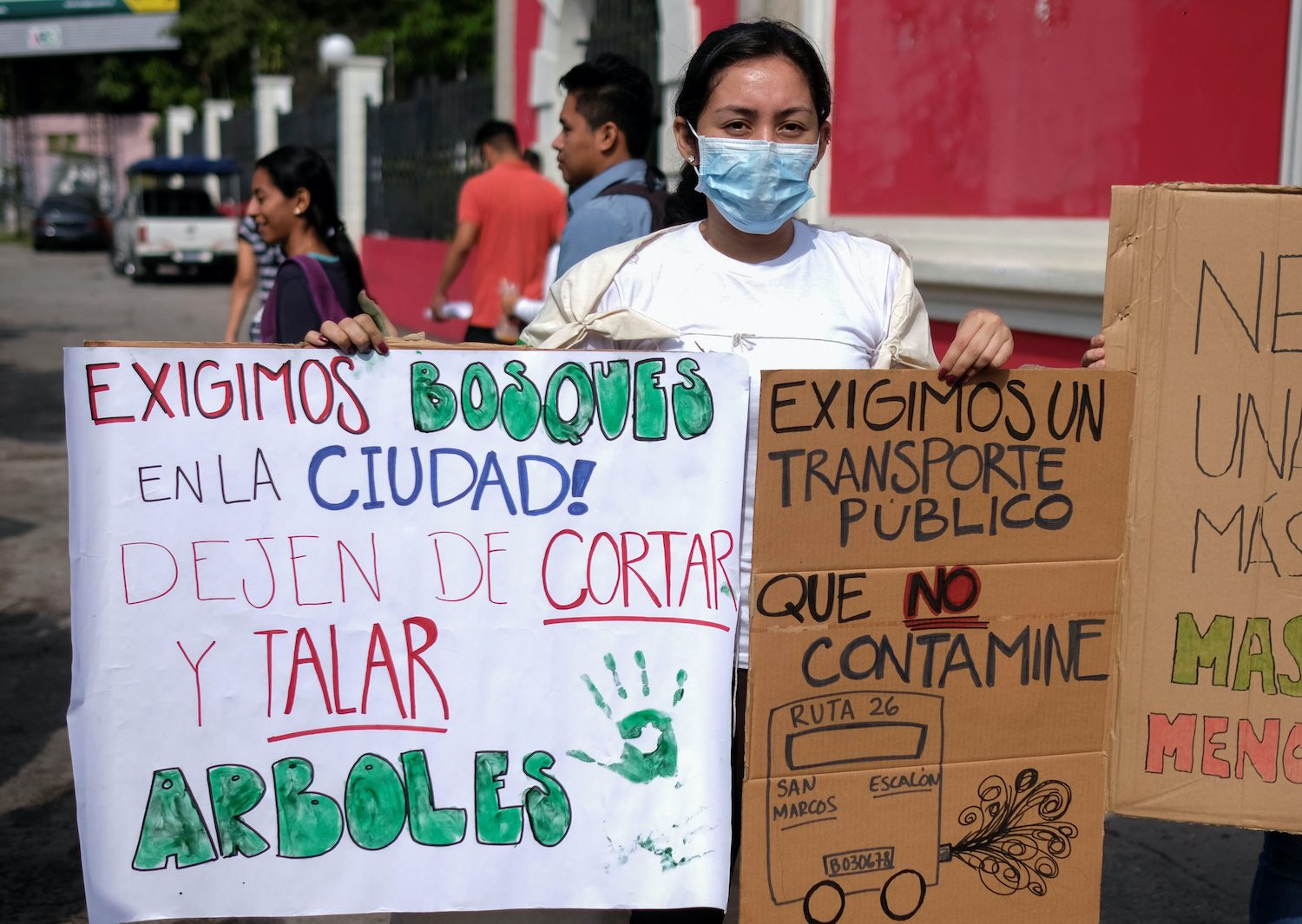Accelerating business confidence in northern Central America: A roadmap for Honduras
Table of contents
Introduction
Honduras’s business climate in context
A roadmap to improving the business climate in Honduras
Conclusion
Acknowledgements
About the authors
Central America Task Force members
Introduction
Honduras, situated in the heart of Central America, stands at a pivotal juncture in its political, economic, and social development. The country has faced numerous challenges over the past decades, from political instability and economic volatility to social unrest and pervasive corruption. However, the political shift marked by the election of Xiomara Castro, the first female president of Honduras, raised expectations for long-awaited reforms.
Castro’s administration began with a focus to tackle corruption, improve governance and the investment climate, and address inequalities. Despite these initiatives, her reforms have faced various levels of success and resistance, with her pledge to establish the International Commission against Corruption and Impunity in Honduras (CICIH) still unfulfilled.1“Kaine Leads Colleagues in Urging Administration to Address Corruption and Protect Civic Space in Honduras,”,Tim Kaine United States Senator from Virginia, October,26,2023, https://www.kaine.senate.gov/press-releases/kaine-leads-colleagues-in-urging-administration-to-address-corruption-and-protect-civic-space-in-honduras Recent events have emphasized the urgency for President Castro to act against corruption. Her controversial decision to end the long-standing extradition treaty between Honduras and the US has sparked widespread debate within the country and internationally, weakening the fight against organized crime.2Sam Woolston, “Honduras Just Killed its Best Drug War Weapon,” InsightCrime, September 3, 2024, https://insightcrime.org/news/honduras-just-killed-its-best-drug-war-weapon/. Castro’s stance has been further shaken by the release of a video that led to the resignation of her brother-in-law, who served as the Secretary of the National Congress, and her nephew, who held the position of Minister of Defense.3Jeff Ernst and David C. Adams, “Narco Video Shows Traffickers Discussing Bribes With Honduras President’s Brother-in-Law,” InsightCrime, September 3,2024, https://insightcrime.org/news/narco-video-shows-traffickers-discussing-bribes-with-honduras-presidents-brother-in-law/. As of early September, Castro is under pressure to resign amidst public demonstrations.4Brendan O’Boyle and Orfa Mejia, “Honduran President faces call to resign as video scandal intensifies,” Reuters, September 4,2024, https://www.reuters.com/world/americas/honduran-president-faces-call-resign-video-scandal-intensifies-2024-09-04/. This scandal has raised serious concerns both at home and abroad regarding the extent of corruption and the pervasive influence of drug networks in Honduras’s political sphere. These events highlight the necessity for effective measures to combat drug trafficking and regulate electoral campaign financing.
From a broader macroeconomic perspective, Honduras is intricately linked to the wider regional dynamics of Central America. As part of Northern Central America, alongside Guatemala and El Salvador, Central America’s second largest country also grapples with the intertwined issues of unemployment, poverty, violence, and migration. The sub-region faces common struggles against organized crime and corruption, which significantly impacts the economic and social fabric of each nation. Additionally, the Honduran economy’s heavy reliance on remittances —over a quarter of the gross domestic product5Ismael Cruceta, Marcela Diaz and Erick Escoto, “Remittances Offer Hope for Struggling Hondurans,” The Storyteller, International Organization for Migration, 2023, https://storyteller.iom.int/stories/remittances-offer-hope-struggling-hondurans#:~:text=Remittances%20are%20among%20the%20main,approximately%20USD%202%2C200)%20per%20year.—primarily from the United States, introduces vulnerability to changes in domestic US policy and economic fluctuations. Compounding these challenges, climate change exacerbates natural disasters like hurricanes and droughts, further straining Honduras’ social conditions, economic resources, and infrastructure.
One of the most significant geopolitical shifts under Castro’s administration was the decision to switch diplomatic recognition from Taiwan to China. This move—not totally unexpected from Castro’s campaign6Atlantic Council experts, “Experts React: Honduras Is Establishing Ties with China. What Should Taiwan and the US Do?,” New Atlanticist, Atlantic Council blog, March 15, 2023,
https://www.atlanticcouncil.org/blogs/new-atlanticist/experts-react-honduras-is-establishing-ties-with-china-what-should-taiwan-and-the-us-do/.—was seen as a way to explore new opportunities for foreign investment, trade, and infrastructure development, potentially impacting Honduras’s economic landscape. However, it has also brought challenges, including putting at stake Honduras’s long-standing relationships with allies and partners in the Western Hemisphere, and ensuring that any new partnerships translate into tangible benefits for the Honduran population.
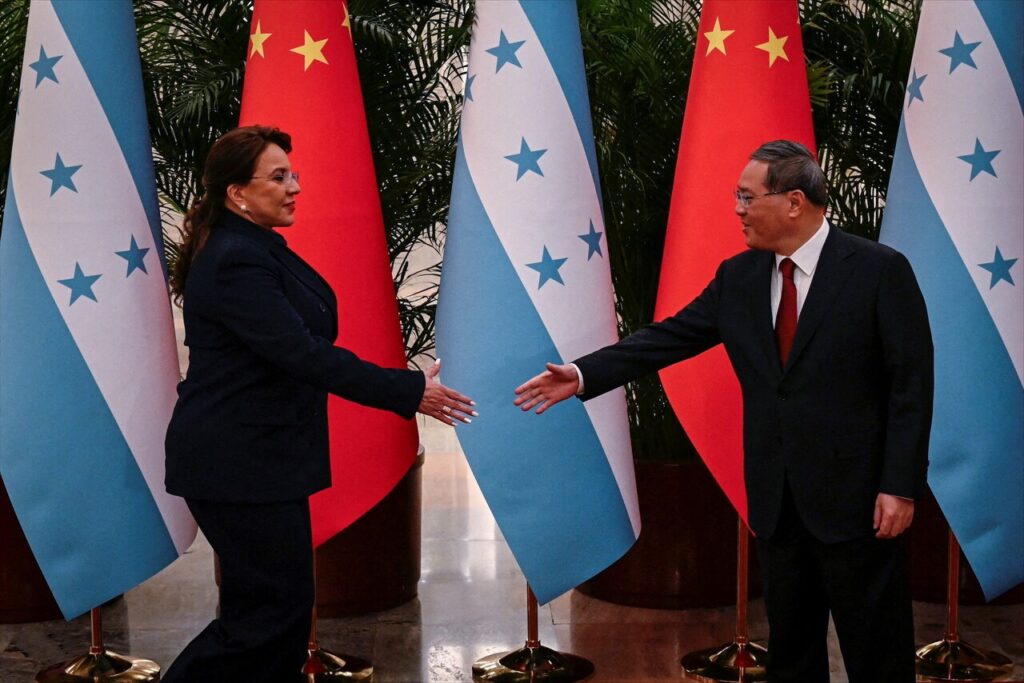
Additionally, Honduras continues to face severe energy challenges that impede economic growth and development. Frequent power rationing, driven by inadequate investment in transmission and distribution systems, coupled with the failure to increase grid capacity, highlights the urgent need for competitive tenders and investment in firm power generation. This investment is crucial not only for addressing current energy deficits, but also for unlocking the country’s future energy potential. Furthermore, significant fiscal challenges exacerbate the problem. The state-owned energy company, ENEE, accumulated a staggering overall debt of approximately $4.29 billion by May 2024,7Mesa Editorial, “Deuda de la ENEE crece a 106 mil 533 millones de lempiras a mayo de 2024,” DineroHN, August 8,2024, https://dinero.hn/deudas-de-la-enee-aumentan-hasta-los-106-mil-500-millones-de-lempiras-a-mayo-de-2024/with an estimated $75 million owed to the private sector.8Mesa Editorial, “Deuda de la ENEE con generadores supera los L18.800 millones a mayo,” DineroHN, August 21,2024, https://dinero.hn/deuda-de-la-enee-con-generadores-supera-los-l18-600-millones-a-mayo/ These financial issues are an additional strain to Honduras’s energy infrastructure and underscore the need for comprehensive reforms to stabilize the energy sector and the broader economy. Addressing these energy challenges is critical not only for promoting economic and fiscal stability but also for improving the overall quality of life for Hondurans.
While overcoming these domestic challenges remains crucial, Honduras is at a critical moment where global economic trends, such as nearshoring, offer promising opportunities for growth. As companies seek to relocate their manufacturing and services closer to North American markets, Honduras could potentially become a key player in regional supply chains. By leveraging its strategic location, improving infrastructure, enhancing workforce skills through education and vocational training, and providing legal certainty in-country, Honduras could be an attractive destination for nearshoring and foreign investments. Próspera has been held up as an example of this potential.A private city and special economic zone on Honduras’s Roatan Island, it was designed to operate under its own fiscal, regulatory, and legal framework. Próspera aimed to attract foreign direct investment and drive economic development,9Guillaume Long and Alexander Main, “How a Start-Up Utopia Became a Nightmare for Honduras,” Foreign Policy, January 24, 2024, https://foreignpolicy.com/2024/01/24/honduras-zedes-us-prospera-world-bank-biden-castro/.though the future of Próspera and Próspera-like enterprises remains in “limbo” after Castro repealed, in her first days in office, the Special Economic Zone law.10Marlon González, “Honduran Economic Zones in ‘Limbo’ after Government Repeal,” Associated Press, April 30, 2022, https://apnews.com/article/business-honduras-tegucigalpa-congress-729148e8d4415403e2749a13e23f306b. This move has raised concerns among international investors and US lawmakers, including Senators Cardin and Hagerty, who have emphasized the importance of respecting existing investments and maintaining a stable and predictable business environment in Honduras.11“Hagerty and Cardin Urge State Department to Encourage Honduras to Honor Legal Guarantees with Respect to US Investments,”Bill Cardin US Senator for Tennessee, October 13,2022, https://www.hagerty.senate.gov/press-releases/2022/10/13/hagerty-and-cardin-urge-state-department-to-encourage-honduras-to-honor-legal-guarantees-with-respect-to-u-s-investments/
In this context, for over a year, members of the Atlantic Council’s Central America Task Force (CATF)—a nonpartisan, high-level group of leaders from government, business, and civil society mostly from El Salvador, Guatemala, and Honduras—set out to provide independent analysis and recommendations on how to accelerate business confidence in Honduras. This roadmap—the first of a two-part series by the Atlantic Council’s Adrienne Arsht Latin America Center and DT Institute—focuses on pragmatic recommendations specifically tailored to Honduras, to assist in tackling corruption and strengthening business confidence. In close collaboration and through repeated consultations with the CATF, this brief explores core issues facing Honduras and outlines actionable recommendations for the public and private sectors to undertake to improve the country’s business climate.
Honduras’s business climate in context
Honduras possesses numerous attributes that appeal to both local and global investors, including its strategic proximity to US markets, favorable legal protections, and low tariffs facilitated by the Dominican Republic-Central American Free Trade Agreement (CAFTA-DR), abundant natural resources, and productive agricultural sectors. However, the investment landscape is marred by persistent uncertainties stemming from corruption, legal domestic and international inconsistencies, costly and unreliable energy supply, bureaucratic hurdles in licensing and permitting, and deteriorating infrastructure, all of which pose significant obstacles to enterprises across the spectrum. According to the International Monetary Fund (IMF), Honduran real gross domestic product (GDP) grew by 4 percent in 2022—nearly identical to Guatemala’s 4.1 percent growth and 1.2 percentage points above neighboring El Salvador’s—and is estimated to grow by 3.6 percent by the end of 2024, marginally outperforming Guatemala, and El Salvador by 0.1 and 0.6 percent, respectively.12“Real GDP Growth,” International Monetary Fund, last updated 2024, https://www.imf.org/external/datamapper/NGDP_RPCH@WEO/OEMDC/ADVEC/WEOWORLD/HND?year=2024.
President Castro’s administration has proposed an ambitious agenda for the “refoundation” of the country,13Sonia Pérez D. and Marlon González, “Xiomara Castro Asume en Honduras y Promete Refundación,” Los Angeles Times en Español, January 27, 2022, https://www.latimes.com/espanol/internacional/articulo/2022-01-27/xiomara-castro-asume-en-honduras-y-promete-refundacion. purportedly targeting systemic corruption and advocating for the introduction of an inclusive economic framework. However, little progress or change has happened, mostly due to institutional uncertainties in the Legislative Branch, the rapid pace of legislative and regulatory changes, coupled with a narrative that often blames the private sector for societal woes14Proceso Digital, “Ministro Ramos Responsabiliza a Sector Privado de Pésima Condición de Carreteras | Proceso Digital,” Proceso Digital, October 1, 2023, https://proceso.hn/ministro-ramos-responsabiliza-a-sector-privado-de-pesima-condicion-de-carreteras/.have fostered an atmosphere of unpredictability, resulting in diminished private investment and job opportunities.15Xiomara Orellana, “Incertidumbre Política y Económica Erosionan El Clima de Inversión Para 2024: Expertos,” Tu Nota, December 14, 2023, https://www.tunota.com/honduras-hoy/articulo/incertidumbre-politica-y-economica-erosiona-el-clima-de-inversion-para-el-2024-2023-12-14.
Lack of public-and private-sector coordination
While the Castro administration has publicly acknowledged the importance of foreign direct investment for generating opportunities, job creation, and economic expansion,16Agence France-Presse, “Honduras Ante ‘Gran Oportunidad’ de Captar Inversión Extranjera, Asegura Nominada Embajadora de EEUU,” France 24, February 9, 2022, https://www.france24.com/es/minuto-a-minuto/20220209-honduras-ante-gran-oportunidad-de-captar-inversi%C3%B3n-extranjera-asegura-nominada-embajadora-de-eeuu.conflicting views within the government about the private sector’s contribution to national welfare have created uncertainty. This inconsistency has raised concerns among Honduran businesses regarding the administration’s commitment to fostering a stable and conducive investment environment. One example was the introduction of the Tax Justice Law bill, which was presented to Congress without consultation with the private sector. Introduced in April 2023, the reform bill sought to overhaul the tax system by introducing progressive tax principles, transitioning from territorial to worldwide income taxation, and eliminating the possibility of forgiving tax debts, among other reforms.17Abdul Muheet Chowdhary, Kuldeep Sharma, and Kolawole Omole, “Honduras’ Tax Justice Law: Increasing Tax Collection to Achieve the SDGs without Increasing Tax Rates,” SouthViews no. 270, July 26, 2024, https://www.southcentre.int/wp-content/uploads/2024/07/SV270_240726.pdf. The lack of dialogue with the business community for this proposal was seen as detrimental because it undermined the private sector’s confidence in the government’s willingness to collaborate on policies that directly affect their operations.
Additionally, the international investment community has echoed such uncertainty. The US State Department’s 2023 Investment Climate Statements on Honduras highlight that US businesses believe the administration’s policies have weakened Honduras’s appeal as an investment destination relative to its Central American neighbors.18Scott Hansen, “2023 Investment Climate Statements: Honduras,” US Department of State, 2023, https://www.state.gov/reports/2023-investment-climate-. For instance, the repeal of the hourly employment law in April 2022, which eliminated flexible hiring practices essential for seasonal and part-time workers,19Karen Mendoza, “Urgen Ley Que Permita Contratos Temporales Ante Llegada de Semana Santa,” Tiempo, March 16, 2024, https://tiempo.hn/urge-ley-contratos-temporales-semana-santa/#:~:text=El%2028%20de%20abril%20del.is one policy decision that raised concerns about the country’s attractiveness for investment. which raised concerns about potential expropriation risks if power-purchasing agreements could not be renegotiated, further damaged investor confidence. Although the government has renegotiated eighteen contracts,20“Fruto de Histórica Renegociación de Contratos de Energía llega al Congreso,Secretaría de Energía,May 7,2024, https://sen.hn/fruto-de-historica-renegociacion-de-contratos-de-energia-llega-al-congreso/#:~:text=La%20renegociaci%C3%B3n%20inici%C3%B3%20el%2016,los%20acuerdos%20entre%20empresarios%20y these are still “stuck” and pending approval from the National Congress. This reform has not only discouraged private investment but also limited the commercial sector’s ability to privately contract energy, leaving economic growth dependent on the pace and capacity of ENEE.
To address these issues, fostering a consistent and robust dialogue between the public and private sectors is essential. Such engagement would help harmonize policies, build mutual trust, and create a more stable and attractive investment environment in Honduras.
Cumbersome and costly regulatory environment
Honduras’s regulatory environment is characterized by complexity and inefficiency, creating challenges for businesses, and hindering economic growth. The country’s regulatory framework is often burdensome, with numerous bureaucratic procedures and regulations that businesses must navigate to operate legally. Starting a business in Honduras involves multiple steps, taking an average of forty-two days to complete, and incurs high costs equivalent to 28.1 percent of per capita GDP.21World Bank, Doing Business 2020 (Washington: World Bank, 2020), DOI:10.1596/978-1-4648-1440-2.Additionally, obtaining business licenses and permits can be time-consuming and costly due to excessive red tape and administrative hurdles. Cumbersome customs procedures and trade regulations further exacerbate the challenges, impeding the smooth flow of goods and increasing business transaction costs.
These regulatory barriers contribute to a lack of competitiveness, stifling innovation and entrepreneurship while deterring foreign investment. Simplifying regulations, streamlining administrative processes, and enhancing transparency and accountability in regulatory enforcement are essential steps to alleviate the burden of the regulatory environment and foster a more conducive business climate in Honduras.
Issues with the rule of law
Honduras’s rule of law faces significant challenges marked by weak governance, widespread corruption, and limited access to justice. The country struggles with institutional fragility, where political interference often undermines the independence of the judiciary and law enforcement agencies. Corruption is pervasive across various sectors, hindering accountability and eroding public trust in government institutions. Furthermore, the recent denunciation of the extradition agreement between the US and Honduras is a major setback in the fight against drug trafficking.22Sam Woolston, “Honduras Just Killed its Best Drug War Weapon,” InsightCrime, September 3, 2024, https://insightcrime.org/news/honduras-just-killed-its-best-drug-war-weapon/It undermines previous efforts to decrease high levels of violence, organized crime, and gang violence. It also poses significant threats to citizen security and the rule of law.
As mentioned in a previous Atlantic Council report, civil service reform and “debloating” the government payroll is essential to combat corruption.23María Fernanda Bozmoski et al., “Combatting Corruption in the Northern Triangle: Prioritizing a Whole-of-Society Approach,” Issue Brief, Atlantic Council Adrienne Arsht Latin America Center and DT Institute, May 2021, https://www.atlanticcouncil.org/wp-content/uploads/2021/05/AC_CentAmerBrief051925.pdf. Such reforms can help professionalize the public sector and create a merit-based system that rewards competence and performance. Reforms in civil service can attract top talent and establish a permanent core bureaucracy to ensure long-term continuity for institutional and economic policy, as well as insulate key government functions from undue political influence.
Despite facing challenges, ongoing efforts persist in addressing the fragility of the rule of law in Honduras. One notable initiative is the Justice, Human Rights, and Security Strengthening Activity (Unidos por la Justicia), launched by the US Agency for International Development (USAID) in 2016.24DAI, “USAID Launches Next-Generation Project to Reduce Impunity and Corruption in Honduras,” DAI, August 22, 2022, https://www.dai.com/news/usaid-launches-next-generation-project-to-reduce-corruption-in-honduras. This project aims to enact institutional reforms, enhance access to justice and civil society, bolster law enforcement, and empower women to combat gender-based violence. Furthermore, the Biden administration committed US$4 billion25Tracy Wilkinson, “News Analysis: U.S. Expands Fight against Central American Corruption. Will It Stem Immigration?,” Los Angeles Times, July 15, 2021, https://www.latimes.com/politics/story/2021-07-15/biden-expands-fight-against-corruption-central-america.over four years to combat crime, poverty, and corruption in Honduras, as well as in neighboring countries El Salvador and Guatemala, under a plan titled US Strategy for Addressing the Root Causes of Migration in Central America.26National Security Council, U.S. Strategy for Addressing the Root Causes of Migration in Central America, White House, July 2021, https://www.whitehouse.gov/wp-content/uploads/2021/07/Root-Causes-Strategy.pdf. Since 2021, the root causes strategy has attempted to address the underlying drivers of irregular migration from Central America. The United States government assistance has been directed toward generating over 90,000 jobs and providing $179 million in financing for micro and small businesses. Additionally, investments totaling over $4 billion have been committed to strengthen economic security, enhance food security for over 275,000 individuals, and provide education and vocational training for thousands of youths,27White House, “FACT SHEET: Update on the U.S. Strategy for Addressing the Root Causes of Migration in Central America,” Statement, White House Briefing Room, February 6, 2023, https://www.whitehouse.gov/briefing-room/statements-releases/2023/02/06/fact-sheet-update-on-the-u-s-strategy-for-addressing-the-root-causes-of-migration-in-central-america-2/.though it is important to note that many of these initiatives were already underway prior to the strategy’s launch. While this initiative has aimed to mitigate migration pressures, it has been criticized for its approach. A year after the strategy was launched, Marisa Limón Garza, deputy director at the Hope Border Institute, pointed out that while the administration has taken positive steps, outdated deterrence tactics and the lack of humanitarian approaches toward rising migration hinder broader reform efforts.28Teresa Welsh, “Hurdles Remain for Biden’s ‘Root Causes’ Strategy in Central America,” Devex platform, February 4, 2022, https://www.devex.com/news/hurdles-remain-for-biden-s-root-causes-strategy-in-central-america-102592. Furthermore, critics have expressed concerns that the strategy’s emphasis on financial aid lacks clear accountability mechanisms to address immigration pull factors directly, as well as measurable targets to ensure long-term results rather than mere temporary relief.29Center for Homeland Security and Immigration, “Why the Biden-Harris Administration’s ‘Root Causes’ Strategy is not a Border Security Solution,” Expert Insights, America First Policy Institute, August 20,2024, https://americafirstpolicy.com/issues/why-the-biden-harris-administrations-root-causes-strategy-is-not-a-border-security-solution
Infrastructure challenges
Honduras still lacks key elements of physical infrastructure to capitalize on opportunities for trade and investment. The country’s expensive and unreliable energy, inadequate public utilities, and e-government digital systems present some of the greatest obstacles to private-sector development and investment.
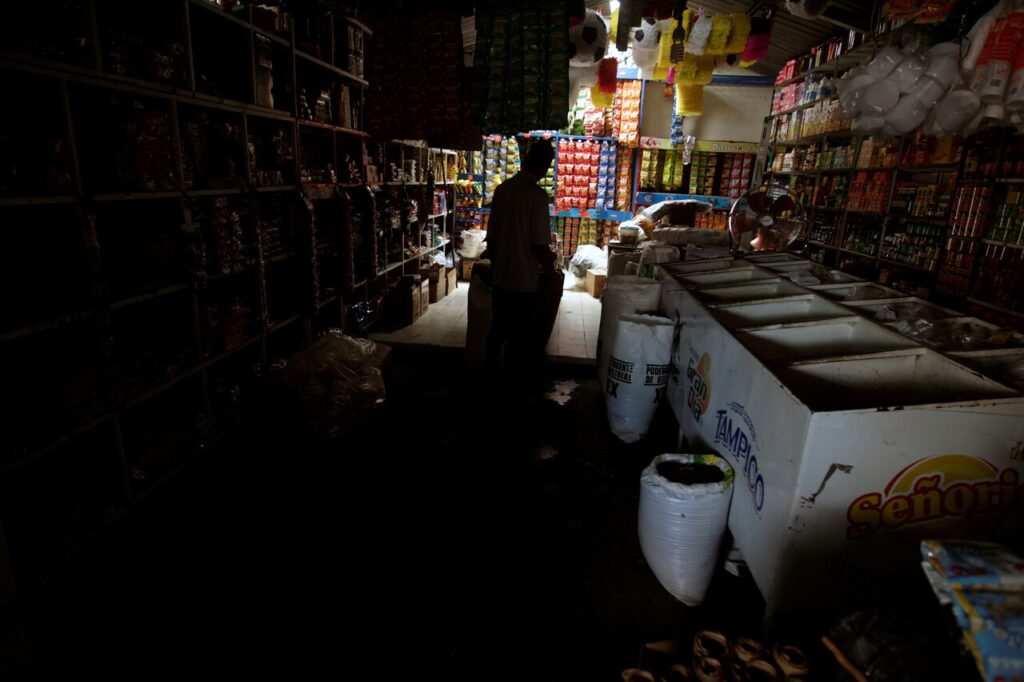
Improving Honduras’s energy sector is crucial for reducing costs and enhancing reliability, which are vital for business operations. Chronic issues such as energy shortages and high costs persist, particularly in rural areas where electrification rates are lowest (more than one in four households lack access to electricity).30Comisión Económica para América Latina y el Caribe (CEPAL), “Informe nacional de monitoreo de la eficiencia energética de Honduras, 2018” (Documentos de Proyectos 43983, Naciones Unidas Comisión Económica para América Latina y el Caribe, 2018), https://ideas.repec.org/p/ecr/col022/43983.html. Daily blackouts are common; as of June 2023, the Honduran government started to implement scheduled blackouts to ration electricity throughout the country.31El País, “Honduras Impone el Racionamiento de Luz Ante La Crisis Energética,” El País, June 15, 2023, https://elpais.com/internacional/2023-06-15/honduras-impone-el-racionamiento-de-luz-ante-la-crisis-energetica.html. In 2023, electricity losses were estimated to be as high as 37.7 percent of total production, increasing the National Electricity Company’s debt to approximately US$4.17 billion32Mesa Editorial, “Deuda de la ENEE crece a 106 mil 533 millones de lempiras a mayo de 2024,” DineroHN, August 8,2024, https://dinero.hn/deudas-de-la-enee-aumentan-hasta-los-106-mil-500-millones-de-lempiras-a-mayo-de-2024/ compared to US$3.4 billion in 2020.33International Finance Corporation (IFC), Country Private Sectoral Diagnostic: Creating Markets in Honduras (Washington: World Bank Group, May 2022), https://www.ifc.org/content/dam/ifc/doc/mgrt/cpsd-honduras.pdf. Despite efforts to increase installed capacity and meet growing demand, transmission and distribution losses remain high due to theft and illegal connections. As a result of energy losses, many firms resort to owning generators to mitigate the effects of unreliable electricity supply. However, these generators contribute to operational costs and indicate shortcomings in the public utility’s service provision.
Furthermore, ENEE’s mounting debt to private generators has created significant challenges. The government’s failure to make payments has destabilized these companies financially, forcing them to seek additional financing to keep their operations running and continue supplying energy. Génesis Rodezno, Executive Director of the Honduran Association of Electric Power Producers (AHPEE), has highlighted that ENNE’s failure to pay on time increases the cost of credits provided by private banks, putting at risk the survival of these companies.34Mesa Editorial, “La deuda de la ENEE con generadores supera los L14.000 millones:Ahppe,” DineroHN,April 9,2024, https://dinero.hn/la-deuda-de-la-enee-con-generadores-supera-los-l14-000-millones-ahppe/ In turn, this financial instability threatens the country’s overall energy supply. Thus, addressing inefficiencies in the electricity sector is essential for promoting business growth and economic development in Honduras, requiring comprehensive reforms to enhance infrastructure, reduce losses, and improve service quality.
A lack of digital infrastructure has long impacted the country’s ability to partially or fully digitalize, leading to limited access to information and public services, particularly for people living in remote areas. According to the United Nations’ E-Government Development Index, Honduras ranks second to last in the Americas in terms of using information technologies to promote access and inclusion of its people.35“UN E-Government and Knowledgebase,” United Nations Department of Economic and Social Affairs, Country Data for 2018, https://publicadministration.un.org/egovkb/en-us/Data-Center. These low levels of digitization result in a lack of transparency and accountability by impeding access to information, increasing the risk of errors, and limiting the ability to track government actions effectively, making it more difficult to detect and prevent corrupt practices. Importantly, a lack of digital infrastructure makes it more difficult for local and international businesses to access information, communicate with customers and suppliers, and conduct financial transactions. According to the UN Conference on Trade and Development’s B2C E-commerce Index, which measures an economy’s preparedness to support online shopping, Honduras ranks 98 out of 152 countries surveyed.36UN Conference on Trade and Development, B2C E-Commerce 2020 Index: Spotlight on Latin America and the Caribbean, 2020, https://unctad.org/system/files/official-document/tn_unctad_ict4d17_en.pdf.
Human capital
Honduras faces significant challenges related to human capital, including limited access to quality education, skills gaps in the workforce, and elevated levels of informality. The country’s education system struggles with inadequate funding, infrastructure, and teacher training, resulting in low educational attainment levels and a lack of necessary skills in the workforce. This hinders productivity and innovation, limiting economic growth and development opportunities. Furthermore, a substantial portion of the workforce operates in the informal sector—which today accounts for a significant portion of the country’s economic activity, estimated at around 70 percent of total employment—lacking access to social protections and training opportunities, exacerbating inequalities, and perpetuating poverty. Additionally, brain drain remains a concern, with skilled workers often seeking opportunities abroad due to limited prospects and economic instability at home. Addressing these human capital challenges requires investment in education and vocational training programs, as well as policies to promote formal employment and create pathways for skills development and retention. By prioritizing human capital development, Honduras can unlock its potential for sustainable growth and prosperity.
Notwithstanding these five types of challenges, Honduras presents lucrative business prospects, attracting continued interest from multinational corporations.
International commission against corruption and impunity
Public corruption—the abuse of power by a government official for personal gain or other improper purposes, often involving bribery, embezzlement, or misuse of public funds or resources—and weak rule of law are long-standing challenges for strengthening democratic institutions and sustaining economic development in Honduras. According to the Honduran Social Forum on External Debt, corruption cost Honduras about $10.3 billion between 2014 and 2018, the equivalent of 10.0 to 12.5 percent of the country’s GDP.37Gabriela Castellanos et al., “Estudio: Estimación Del Impacto Macroeconómico de La Corrupción en Honduras,” Consejo Nacional Anticorrupción, n.d., https://fosdeh.com/wp-content/uploads/2020/07/Estimacion-de-la-corrupcion-en-hn.pdf.Combating corruption and impunity and reversing the effects of such losses are essential to ensure a productive, sustainable, and healthy socioeconomic and political climate. That is why it was welcome news on December 15, 2022, that the Honduran government signed a memorandum of understanding with the UN for the installation of an International Commission against Corruption and Impunity (CICIH by its abbreviation in Spanish). To date, details about its scope and duration have not been disclosed.38Reuters staff, “Honduras Signs U.N. Deal Paving Way for Anti-Corruption Commission,” Reuters, December 15, 2022, sec. Americas, https://www.reuters.com/world/americas/honduras-signs-un-deal-paving-way-anti-corruption-commission-2022-12-15/. But the CATF believes that CICIH must, at a minimum, have the authority to conduct the following:
1. Independent operation operation with the full support of Honduran institutions;
2. Discretion to investigate corruption and prosecute crimes alongside the Public Prosecutor’s Office;
3. and Independent process to select its members.
Where does it stand? The UN proposed in 2022 that the mechanism have powers to “carry out investigations independently, as well as establish itself as a private prosecutor,” but the government, in its counterproposal, was clear that criminal accusations must always originate with the Public Ministry.39Jorge Burgos, “Propuesta de Honduras Sobre CICIH Se Mantiene, Pero Descarta Que Sea Acusador Privado,” Criterio, August 24, 2022, https://criterio.hn/propuesta-de-honduras-sobre-cicih-se-mantiene-pero-descarta-que-sea-acusador-privado/.
Public ministries and attorneys general play a pivotal role in the judicial systems of Central American countries. They are the primary institutions responsible for prosecuting crimes, including corruption. These entities are tasked with upholding the rule of law, ensuring justice is served, and maintaining public trust in the legal system. However, their effectiveness is often undermined by political interference, lack of resources, and endemic corruption within their own ranks.
A roadmap to improving the business climate in Honduras
The Central America Task Force set out to discuss and define how the United States can work with Honduras and other Northern Central American countries to accelerate business confidence and promote greater economic development and investments while best supporting Honduras in combating corruption and strengthening the rule of law. The Task Force’s recommendations pursue three broad objectives. First, they seek to improve public-private coordination to enhance investor confidence. Second, the recommendations identify areas where rule of law, judicial framework, and human capital can enhance Honduras’s business climate. Finally, the recommendations aim to position the United States to partner with an increasingly prosperous and capable Honduras to advance mutual economic and geopolitical interests.
Improving governance and the rule of law
Ensuring electoral integrity is an essential first step to strengthen political trust and ensure a level playing field for businesses. If former President Juan Orlando Hernandez’s trial taught Honduras anything, it was that the country needs to strengthen its laws around electoral procedures: US prosecutors allege that Hernandez took approximately US$1 million in bribes to finance both his 2013 and 2017 presidential campaigns.40US Department of Justice, “Juan Orlando Hernández, Former President of Honduras, Indicted on Drug-Trafficking and Firearms Charges, Extradited to the United States from Honduras,” US Department of Justice Office of Public Affairs, April 21, 2022, https://www.justice.gov/opa/pr/juan-orlando-hern%C3%A1ndez-former-president-honduras-indicted-drug-trafficking. In 2025, Honduras will hold general elections, underscoring the urgency of introducing regulations on party finances and new laws that would allow for cooperation agreements with individuals under criminal investigation. This practice to confront illicit campaign financing, which is commonly used in the United States, was a key factor in the successful prosecution of major corruption cases by the now-defunct International Commission against Impunity in Guatemala (CICIG).41Comisión Internacional Contra la Impunidad en Guatemala, “Mandato Y Acuerdo CICIG ,” Comisión Internacional Contra la Impunidad en Guatemala, March 5, 2018, https://www.cicig.org/cicig/mandato-y-acuerdo-cicig/. By leveraging testimony from lower-level participants, CICIG was able to go after high-level corrupt individuals such as politicians, former military officials, and businesspeople, although there is controversy around the reach of the CICIG. Nevertheless, while CICIG was able to expose several criminal networks, its relative success was mixed as it often faced criticism for excessive zeal in criticizing judges and uneven management of its cases. While not a perfect instrument, CICIG stands as a potential model for countries struggling with entrenched corruption, and many lessons could be learned from its existence.
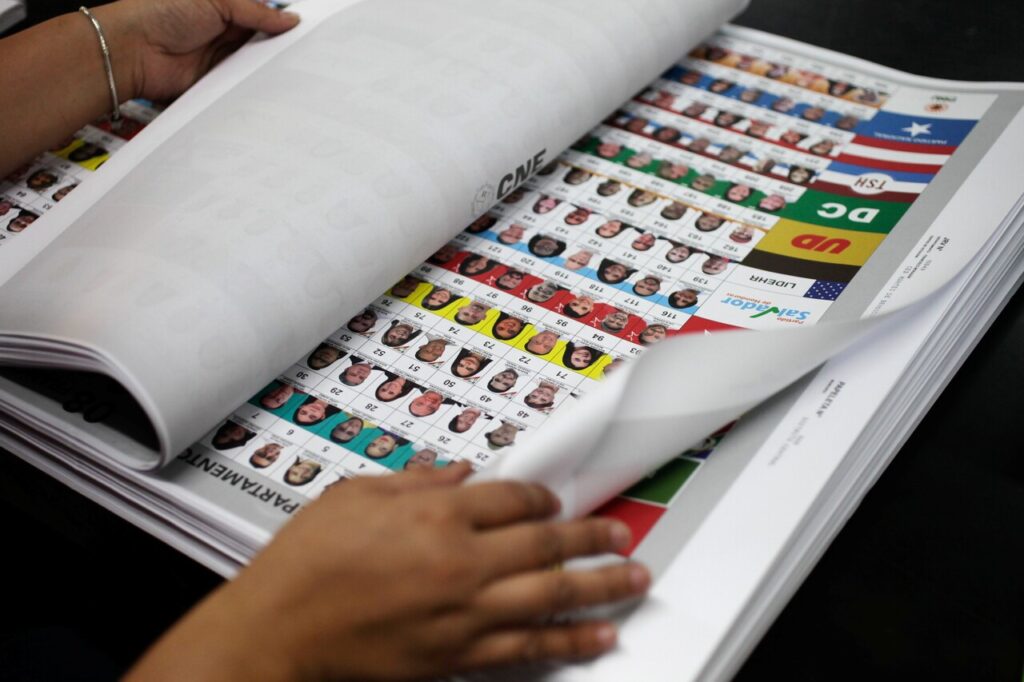
To solidify short-term wins into long-term gains in strengthening the rule of law, the Honduran government should continue to enact civil service reforms that promote transparency, accountability, and merit-based hiring practices. This could include the establishment of an independent civil service commission that oversees hiring, promotions, and dismissals. For example, the Special Law on the Organization and Functioning of the Nominating Board for the Proposal of Candidates for Magistrates of the Supreme Court of Justice, passed in July 2022, was a welcome reform that seeks to limit external interference in the selection of magistrates.42Ley Especial de Organización y Funcionamiento de la Junta Nominadora para la Proposición de Candidatos a Magistrados de la Corte Suprema de Justicia, Poder Legislativo
Decreto No. 74-2022, https://www.tsc.gob.hn/biblioteca/index.php/leyes/1156-ley-especial-de-organizacion-y-funcionamiento-de-la-junta-nominadora-para-la-proposicion-de-candidatos-a-magistrados-de-la-corte-suprema-de-justicia. The Honduran government should also invest in training and capacity building for civil servants with the help of USAID to ensure they have the skills and knowledge necessary to perform their duties effectively. Accumulating human capital and skills within the civil service is difficult, as only 20 percent of workers are part of career civil service while the remaining 80 percent are temporary contractors with high turnover rates.43M. Porrúa et al., eds., Transformación digital y empleo público: El futuro del trabajo del gobierno (Washington: Inter-American Development Bank, 2021). Resuming the School of High Public Management project, created on 2018 by the Council of Ministers’ Decree PCM-19-2018, would be a positive step toward addressing this challenge. This initiative, which was supported by the Honduran government and the European Union, aimed to improve high-ranking public officials’ leadership skills, understanding of public administration and ability to optimize state resources.44“Escuela de Alta Gerencia Pública entra en etapa de operatividad,” Embajada de España en Honduras, https://www.aecid.hn/sitio/index.php/noticias/603-eagp-inicia By fostering a results-based management culture and promoting accountability, it could contribute to addressing the civil service’s existing challenges. Finally, the government should also provide incentives for civil servants to report corruption and protect whistleblowers from retaliation.
Finally, the growing awareness of responsible business conduct (RBC) in Honduras presents an opportunity to promote transparency and responsible practices within the private sector in the long term. Organizations like the Honduran Corporate Social Responsibility Foundation (FUNDAHRSE) are crucial in providing training and support to businesses, especially small and medium-sized enterprises (SMEs), to engage in responsible practices. FUNDAHRSE’s initiative, offering the “Corporate Social Responsibility Enterprise” seal, incentivizes exemplary conduct in areas such as health, education, environment, ethics, employment, and marketing. To further encourage RBC adoption, policymakers can collaborate with FUNDAHRSE to expand its reach and support programs that promote responsible business practices across all sectors. This partnership can enhance Honduras’s business climate, fostering trust and sustainability in the long term.
Improving public-and private-sector engagement, coordination, and policy development
Promoting consensus and coordination between the government, private sector, and civil society is essential for creating a stable and predictable investment climate in Honduras. Collaboration among stakeholders can help identify common goals, address concerns, and develop effective policies and strategies to promote economic growth and development.
The first step to achieving greater public- and private- sector engagement is to establish a public-private dialogue platform. This structured platform would promote periodic dialogue between public- and private-sector representatives and should be facilitated by the government in collaboration with business associations like the Consejo Hondureno de la Empresa Privada (COHEP), local commerce and industry chambers, and civil society organizations. The United States, through several agencies and the American Chambers of Commerce, should also participate as a representative of US businesses operating in Honduras.
The implementation of such a platform has been hindered by historical mistrust, bureaucratic inertia, and competing interests. Such dialogues have occurred in the past, oftentimes on an ad hoc basis, with the last one having occurred in early 2024 after demands from the country’s private sector.45Julio Cruz, “Gobierno Prepara Un Diálogo Con La Empresa Privada,” El Heraldo, January 10, 2024, https://www.elheraldo.hn/honduras/gobierno-prepara-dialogo-con-la-empresa-privada-BH16883165. To overcome these barriers and fragmented efforts to convene such dialogues, an institutionalized platform would provide a formal avenue for stakeholders to discuss key economic issues, exchange information, and address concerns openly and constructively. Importantly, this dialogue would serve as a forum for enhancing transparency and inclusivity in the policymaking process. For example, the Tax Justice bill in Honduras, first presented to Congress by President Castro’s administration, sounded the alarm among business leaders, who feared that it could discourage foreign investment.46La Prensa, “Ley de Justicia Tributaria Hará Que Inversionistas Se Vayan a El Salvador,” La Prensa, March 18, 2024, https://www.laprensa.hn/honduras/ley-justicia-tributaria-inversionistas-irse-el-salvador-NL18206795. Adding to the obstacles posed by the controversial legislation is Honduras’s withdrawal from the International Center for Settlement of Investment Disputes (ICSID), which also threatens foreign investment.47International Centre for Settlement of Investment Disputes, “Honduras Denounces the ICSID Convention,” World Bank Group, February 29, 2024, https://icsid.worldbank.org/news-and-events/communiques/honduras-denounces-icsid-convention. A public-private dialogue would allow private-sector stakeholders to voice these concerns and find pathways to inform policies that would encourage rather than discourage domestic and foreign investors. By involving stakeholders in the decision-making process, the government can gain valuable insights, build support for reforms, and foster a sense of ownership over policy outcomes.
Through this dialogue, Honduran policymakers and private-sector leaders can establish a minimum common agenda aimed at accelerating the country’s economic development. Here, Honduras can replicate Guatemala’s “Guatemala Moving Forward” plan—an interagency and multisectoral cooperation agreement that establishes a roadmap to attract more foreign investment and improve conditions for the Guatemalan economy. Important to its success was political will across administrations (the plan was introduced under former President Alejandro Giammattei’s administration and later adopted by President Bernardo Arevalo). Here, the US government, through its Central America Forward initiative, has already introduced a Business-Enabling Action Plan as part of its lines of effort, which could narrow down some of the focus areas for the minimum common agenda to build from.
As part of the public-private dialogue’s mandate, the Honduran government, in collaboration with private-sector stakeholders, should establish a dedicated fund for financing development-project feasibility studies and economic landscape-mapping exercises. The fund should be governed by a board of directors comprising representatives across the government, private sector, and civil society, ensuring transparency and accountability in fund management. Feasibility studies and mapping exercises should be prioritized by their potential to drive economic growth, create jobs, and address key development challenges in Honduras. Here, international financial institutions and development banks can be crucial partners for raising capital and providing technical expertise. For example, the International Finance Corporation published in 2022 its Country Private Sector Diagnostic (CPSD) report for Honduras, which identified agribusiness, manufacturing, business process outsourcing (BPO), and digital financial services (DFS) for micro, small, and medium-sized enterprises (MSMEs) as sectors where the business community, through government support, can unlock greater investment potential.48IFC, Country Private Sectoral Diagnostic. Doubling down on these studies, the fund would finance additional economic landscape studies like this one to identify areas for business climate improvement and delineate implementation schemes.
Streamlining government processes
Honduras faces significant challenges in its business environment, characterized by complex regulatory processes, bureaucratic inefficiencies, issues with public procurement, and barriers to entry for entrepreneurs. To foster economic growth and attract investment, Honduras must streamline government processes and enhance its regulatory environment.
First, the government, alongside business councils, should undertake a comprehensive review of the Honduran regulatory framework to identify redundant, outdated, or overly burdensome regulations that impede business operations. Honduras should, therefore, enhance transparency in government procedures and transactions. It should do so by widely implementing anonymous reporting channels, which have the potential to enhance the delivery of public services and increase responsiveness to citizen needs. This is especially crucial within the judicial system, where improving transparency can play a pivotal role in reducing impunity and enhancing overall judicial outcomes.
Additionally, the government should prioritize the modernization of regulatory processes through the adoption of digital technologies, automation, and online platforms to streamline administrative procedures and reduce bureaucratic red tape. Here, USAID can encourage the development of strategic blueprints for digital governance, electronic services, and cybersecurity, specifically. With the help of other development agencies, USAID can assist in policy formulation and enhancing institutional capabilities, including collaborating with donors like the Inter-American Development Bank (IDB) and the Government of South Korea on digital transformation initiatives to advance transparency and interoperability among government bodies; and facilitating knowledge sharing and the dissemination of successful practices with governments that have effectively implemented comprehensive digital transformation strategies, like Brazil.
Honduras must also strengthen its institutional capacity for public procurement. Such capacities must include the development of specialized procurement units in government agencies, the establishment of procurement training programs for procurement officials, and the recruitment and retention of qualified procurement staff, the government, and civil society. Additionally, the use of electronic procurement systems, online bidding, and e-procurement portals would help to streamline the procurement process, reduce the risk of fraud and corruption, and increase competition among suppliers. Lastly, an independent procurement oversight body that contemplates the development of a complaints and appeals mechanism and the implementation of anti-corruption measures in line with the broader anti-corruption agenda could help improve the perception of doing business in Honduras.
Addressing infrastructure challenges: energy, transport, and logistics
Infrastructure development is critical for supporting economic growth and attracting investment in Honduras. However, the country faces significant challenges, including inadequate transportation networks, unreliable energy supply, and lackluster digital infrastructure. Addressing these infrastructure deficits requires concerted efforts to invest in upgrading existing infrastructure and developing new projects to meet the needs of businesses and communities.
One area ripe for infrastructure investment is transportation networks, including roads, ports, and airports. Improving road connectivity within Honduras and its neighboring countries can reduce transportation costs, facilitate trade, and stimulate economic activity. For example, Honduran policymakers could prioritize investments in key transportation corridors such as the central, south, and west corridors which connect major urban centers and industrial zones. Additionally, upgrading ports and airports to handle increased trade volumes would complement these efforts by enhancing intraregional connectivity and supporting overall economic growth. Drawing inspiration from Colombia’s example, the 4G Road Infrastructure Program, which has been credited with boosting trade and reducing transportation costs, Honduras could adopt a similar model by engaging in public-private partnerships (PPPs) to finance and manage large-scale projects. Furthermore, upgrading critical infrastructure such as the Port of Cortés and the Ramón Villeda Morales International Airport would improve logistics initiatives and support Honduras’s growing trade needs.
Another critical infrastructure challenge is unreliable energy supply, which poses significant barriers to business operations and investment. Honduras has struggled with high electricity costs and frequent power outages, which negatively impact productivity and competitiveness. To address this issue, the government should implement comprehensive reforms in the energy sector, including promoting private-sector participation, diversifying energy sources, and enhancing grid reliability. On this last point, Honduras should invest in modernizing the electrical grid and its national energy company, ENEE, to improve reliability and reduce outages. This involves upgrading transmission and distribution infrastructure and integrating smart grid technologies. Notably, this has been a focus of the current government, which has allocated 16 percent of public investment- amounting to $232 million- towards these efforts.
In today’s digital age, robust digital infrastructure is crucial for economic development. Honduras lags in digital connectivity, which hampers business efficiency and access to global markets. Investing in digital infrastructure, including expanding broadband access, and enhancing mobile network coverage, is imperative. South Korea’s transformation into a global technology leader was driven by substantial investments in digital infrastructure and education. The country prioritized widespread high-speed internet access and fostered a culture of innovation. Honduras can take similar steps by collaborating with private telecom companies to expand broadband access, particularly in rural areas, and by promoting digital literacy programs to ensure the workforce can effectively utilize digital tools.
By prioritizing investments in transportation, energy, and digital infrastructure, Honduras can create a more conducive environment for business and attract greater investment. These infrastructure improvements are not just about physical assets; they lay the groundwork for enhancing human capital. With better connectivity, reliable energy, and access to digital resources, the Honduran workforce can gain the skills and knowledge necessary to thrive in a competitive global market.
Human capital development
Investing in human capital development is crucial for building a skilled workforce capable of driving economic growth and innovation. The future of Honduran business competitiveness is directly tied to the quality and skills of the current and incoming workforce. However, many entry-level employees lack essential skills for workplace success. The gap between private-sector demands and educational offerings has resulted in systems ill-prepared to meet evolving needs.
Solving this issue involves investing in education and vocational training programs to equip workers with the skills and knowledge needed to succeed in a rapidly evolving economy. This can be managed with a two-pronged approach. On the public-sector side, Honduras should better use the resources allocated toward its education49Informe de Progreso Educativo: Honduras, Fundación para la Educación Ricardo Ernesto Maduro Andreu (Ferema), USAID, Programa de Capacidades LAC Reads, El Diálogo, y Universidad Pedagógica Nacional Francisco Morazán, 2022, https://www.thedialogue.org/analysis/honduras-educational-progress-report/.sector to modernize school infrastructure, improve instructor quality and pay, and prepare students for their future endeavors. On the other hand, private-sector organizations, both domestic and foreign, should institutionalize partnerships with vocational training programs to outline the exact skills they are looking for in potential employees, so that training centers can better prepare their students. By prioritizing investments in education, capacity building, and digital-skills development, Honduras can lay the foundation for sustainable development and attract greater investment in key sectors, such as technology, agriculture, and renewable energy.
COVID-19 spurred a digital learning surge, yet national primary and secondary curricula lack digital literacy, a crucial skill for navigating online platforms safely and effectively. The Ministry of Education initiated the National Digital Education Transformation Program (PNTED) in 2020 to bridge the digital gap.50“Policies and Regulations: National Digital Educational Transformation Program. Decree 132/2020: Honduras,” UNESCO IIPE Office for Latin America and the Caribbean, 2020, https://siteal.iiep.unesco.org/bdnp/3646/programa-nacional-transformacion-educativa-digital-decreto-1322020. However, PNTED does not include strategies for digital literacy implementation in primary and secondary education. Here, the Ministry of Education should spearhead a campaign to embed digital literacy into the national curriculum. This inclusion can mitigate online risks, enhance economic prospects, and align with the PNTED goals. USAID and partners can aid the Ministry of Education by offering technical support, such as aligning digital literacy standards across education levels, enhancing monitoring capabilities for digital platforms, and integrating cybersafety training into the education curriculum. This concerted effort would ensure that students and educators are equipped with essential skills for the digital age.
Conclusion
While Honduras boasts attractive attributes for investors, such as proximity to US markets, persistent challenges hinder its business climate. Corruption, legal inconsistencies, energy supply issues, bureaucratic hurdles, and infrastructure deficiencies deter potential investments. Under President Xiomara Castro’s administration, recent decisions- such as ending the extradition treaty with the United States- have sparked debate about the country’s approach to tacking corruption and strengthening governance, which are key for fostering a more favorable business environment. This situation highlights the need for concrete action to restore confidence in the government’s commitment to reform.
To prevent further deterring investment, enhancing coordination between the public and private sectors is essential. Strengthening governance, improving infrastructure, enhancing human capital, and combating corruption are crucial. Implementing a public-private dialogue platform, streamlining regulations, and investing in education and vocational training can foster economic growth.
Additionally, addressing infrastructure deficits, promoting electoral integrity, and embracing responsible business conduct are essential steps. Collaboration with international partners, like the United States, can provide support and expertise in these endeavors. By addressing these challenges and implementing strategic reforms, Honduras can unlock its potential for sustainable growth and prosperity, attracting greater investment and fostering a conducive business environment.
While Honduras faces significant challenges, there are also immense opportunities for growth and development. By implementing the recommendations outlined in this brief, Honduras can enhance its business climate, attract greater investment, and pave the way for a prosperous future.
Acknowledgements
This roadmap is the first of two as part of the work of the Adrienne Arsht Latin America Center’s Central America Task Force (members listed below), a high-level group of policymakers, business leaders, and civil society from northern Central America that seeks to create a basis for consensus and galvanize support for strengthening the rule of law and mitigating corruption, increasing productivity and enabling sustainable economic development, and reducing conflict in Guatemala, Honduras, and El Salvador. Thank you to Jason Marczak, vice president and senior director for the Adrienne Arsht Latin America Center, for his guidance on this publication, as well as the Atlantic Council’s editorial team. A special mention to Kelsey Page, associate director, communications and editorial at AALAC, and AALAC’s young global professional, Isabella Palacios, for helping bring this publication to the finish line. This publication was produced with the generous financial support of DT Institute. Thank you to DT Institute for their insights and collaboration.
About the authors
María Fernanda Bozmoski is deputy director at the Atlantic Council’s Adrienne Arsht Latin America Center, where she leads the Center’s work on Mexico, USMCA, and Central America. Bozmoski has co-led the Center’s Central America Task Force, managed the Center’s trade portfolio, and programmed events in Asia for US policymakers. Before joining the Atlantic Council, Bozmoski worked at the Cato Institute, the Council of the Americas, and completed an externship at the Inter-American Dialogue. She speaks native Spanish, English, and French, fluent Italian, and near fluent Portuguese.
Eva Lardizábal was an assistant director at the Atlantic Council’s Adrienne Arsht Latin America Center, where she focused on regional economic development and prosperity, Central America, and the rule of law. Lardizábal authored the center’s biweekly Aviso LatAm newsletter and frequently organized policy dialogues with high-level government officials, business leaders, and civil-society members across the United States and Latin America. Prior to joining the Atlantic Council, she worked at the Think Tanks and Civil Societies Program and the Organization of American States. Originally from Honduras, Lardizábal holds a bachelor’s degree in political science and Latin American studies from the University of Pennsylvania.
Central America Task Force Members 2022-2024
El Salvador
Co-chair: Johanna Hill* (Co-chair for El Salvador until her appointment to the WTO)
Maria Eugenia Brizuela de Avila, former minister of foreign affairs (1999–2004); nonresident senior fellow, Adrienne Arsht Latin America Center, Atlantic Council
Ricardo Castaneda Ancheta, senior economist and country coordinator for El Salvador and Honduras, Instituto Centroamericano de Estudios Fiscales (ICEFI)
Juan José Daboub, former minister of finance and chief of staff to the President, Republic of El Salvador; president, HUGE Business and Investment Council
Leonor Selva, executive director, Asociación Nacional de la Empresa Privada (ANEP)
Claudia Umaña, former president, Fundación Salvadoreña para el Desarrollo Económico y Social (FUSADES)
Guatemala
Co-chair: Maria Antonieta del Cid, representative for Central America (1999–2000; 2017–2019), International Monetary Fund; former president of the Bank of Guatemala (2006-2010); former minister of finance (2004-2006), Republic of Guatemala
Roberto Gutierrez, president, Fundación para el Desarrollo Integral de Programas Socioeconómicos (FUNDAP); president, Red Nacional de Grupos Gestores
Guillermo Montano, founder, Transactel, Telus International, Dollar City, and Panamerican Food Company; president, Asociación Guatemalteca de Exportadores (Agexport)
Maria Pacheco, president and founder, WAKAMI
Leticia Teleguario, former minister of Labor and Social Welfare (2016-2018), Republic of Guatemala; Special Advisor on Corporate and Inter-Agency Relationships, UN Women Guatemala
Juan Carlos Zapata, executive director, Fundación para el Desarrollo de Guatemala (FUNDESA)
Honduras
Co-chair: Jorge Ramón Hernández, former judge, Inter-American Commission on Human Rights (IACHR); former ambassador of Honduras to the United States; Former Vice President of the Central Bank of Honduras, Republic of Honduras
Gabriela Castellanos, president, Consejo Nacional Anticorrupción (CNA)
Jaime Díaz Palacios, executive vice president, Central American Bank for Economic Integration (CABEI)
Eduardo Facussé, president, Cortes Chamber of Commerce and Industries (CCIC)
Jacqueline Foglia, executive director, Consejo Nacional de Inversiones (CNI)
Mey Hung, corporate affairs manager for Guatemala and Honduras, Walmart
United States and International Community
Co-chair: Anne W. Patterson, former Assistant Secretary of State for International Narcotics and Law Enforcement; former US ambassador to El Salvador, US Department of State
Abby Daniell, director, Latin America, Canada and Caribbean Public Sector, Amazon Web Services (AWS)
Karim Lesina, executive vice president; chief external affairs officer, Millicom
Jason Marczak, vice president and senior director, Adrienne Arsht Latin America Center, Atlantic Council
Maria Liliana Mor, director of strategic partnerships and development, ProMujer
Salvador Stadthagen, former ambassador of Nicaragua to the United States, Republic of Nicaragua
Related content

The Adrienne Arsht Latin America Center broadens understanding of regional transformations and delivers constructive, results-oriented solutions to inform how the public and private sectors can advance hemispheric prosperity.
Image: Improving Honduras's energy sector is crucial for reducing costs and enhancing reliability, which are vital for business operations. Designed by Freepik
